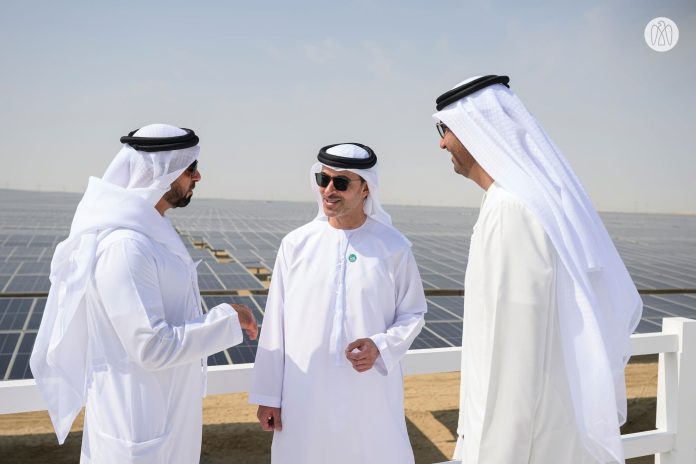Abu Dhabi has taken a significant step towards expanding its renewable energy capacity and achieving net-zero targets with the inauguration of the Al Dhafra solar power plant. Developed by Taqa, Masdar, EDF Renewables, and JinkoPower, this two-gigawatt project is among the world’s largest solar initiatives.
The Emirates Water and Electricity Company will procure electricity from the plant, which is capable of powering 200,000 homes and reducing Abu Dhabi’s carbon emissions by more than 2.4 million tonnes annually – equivalent to removing 470,000 cars from the road. The plant boasts four million solar panels using bi-facial technology for maximum yield.
Moreover, it is located 35km from Abu Dhabi and spanning over 20 square kilometers in the desert. The Al Dhafra project created 4,500 jobs at the peak of its construction and was built in a single phase.
Furthermore, it is owned by Taqa (40%), Masdar (20%), EDF Renewables, and Jinko Power (20% each), the project elevates Abu Dhabi’s solar capacity to 3.2 gigawatts, making it the world’s largest single-site solar power plant.
This initiative underscores the UAE’s commitment to clean energy and reducing carbon emissions. As the UAE prepares to host Cop28, Sheikh Hazza bin Zayed, Deputy Ruler of Abu Dhabi, emphasizes the country’s leadership in developing and adopting innovative clean energy solutions.
Dr Sultan Al Jaber, Cop28 President-designate, Minister of Industry and Advanced Technology, and chairman of Masdar, notes the remarkable progress in solar power efficiency, innovation, and cost competitiveness demonstrated by the Al Dhafra project.
The project, initiated in 2020, aligns with the UAE’s net-zero target by 2050 and its updated Energy Strategy 2050. The UAE plans to invest Dh200 billion by 2030 to meet energy demand while sustaining economic growth.
Beyond solar power, the UAE is actively pursuing hydrogen production, wind projects, and ambitious emissions reduction through its Climate Change Strategy 2023-2027. Masdar, established in 2006, aims for a renewable energy portfolio of at least 100 gigawatts by 2030 and an annual green hydrogen production capacity of up to one million tonnes by the same year.
Globally, the UAE ranks second in per capita solar energy consumption, showcasing its dedication to sustainable energy solutions. Taqa, eyeing 150 gigawatts of gross power generation by 2030, emphasizes a shift towards renewables, reflecting broader trends in the global electricity mix.
As the world moves towards 50% renewable energy in the electricity mix by 2030, initiatives like Al Dhafra underscore the critical role of renewables in achieving climate goals.


